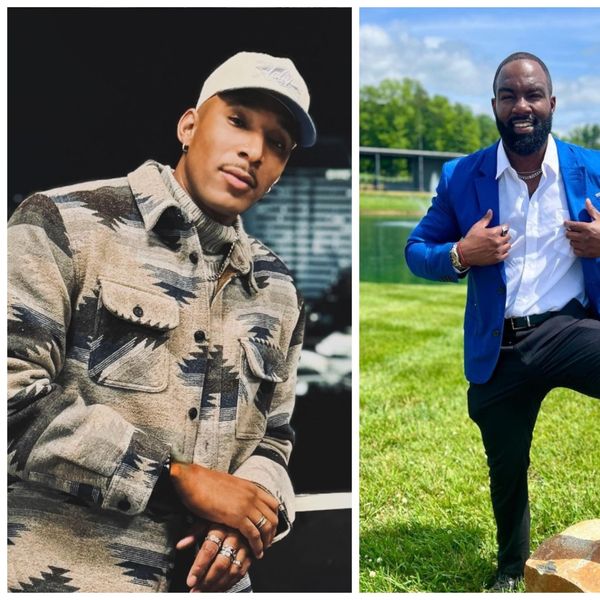
The Verdict Is In, So Now What? Here’s How To Support The Culture After The Derek Chauvin Trial
It's official, guys. Derek Chauvin, the ex-officer who was at the center of the murder of George Floyd, has now been convicted of the crime. To say this is an interesting turn of events is an understatement, but I'm guessing that watching a video of him kneeling on his neck for almost ten minutes, was hard to deny. In fact, Chauvin was found guilty on all counts, a verdict that could send the disgraced former Minneapolis police officer to prison for the rest of his life.
Welp.
The 12 jurors didn't want to hear the defense's claim that there might have been other medical reasons that Floyd died, saying Chauvin killed him, even if unintentionally. And although you and I know that this shouldn't even be a question, it's pretty understood that that damn justice system rarely works in our favor. The fact that the word "nervous" was trending on Twitter prior to the verdict announcement, basically tells you everything you need to know.
But then it happened. It actually happened.
Guilty. Guilty. Guilty. "The selected jury finds you guilty, Derek Chauvin."
The inner child in me wept for the years of blatant disregard for Black life, while the outer gangster in me was relieved that I could, for once, not feel the sting of inequity.
"Today, we are able to breathe again," Floyd's brother Philonise Floyd said afterward. Minnesota Attorney General Keith Ellison, whose office oversaw Chauvin's prosecution, chimed in as well, saying:
"I would not call today's verdict justice, however, because justice implies true restoration. But it is accountability, which is the first step toward justice."
But now what? What's next?
Stay on the gas.

Shutterstock
A major component to the outcome of this trial was the teamwork of millennials, partnered with the fearlessness of Gen-Z in Minnesota. If anything, these two generations in Minnesota is who this victory is owed to. They proved to the entire country that that quiet cousin that never says much, has those hands, and they aren't afraid to swing during the casualties of war to have their voice heard. Minnesota was like, "Peaceful protesting? Tuh. Burn dis bih down." And it was done on a scale that many of us had never experienced, or seen, before. And let's be real, had it not happened, Derek Chauvin would just be another cop who walked free, just as the previous 15K+ officers involved in a police killing have.
They hit the pavement, they demanded justice and let it be very known that anything less, would have consequences. A tone was set. It was beautiful.
But this can't be done each time. Now, it's time to work smarter.
So, identify the 'Stacey Abrams' in your city.
The 2020 election didn't go the way that many racists wanted it to, and we owe that all to a Black woman (of course). Stacey Abrams is a master in chess, outplaying her opponents at their own game. She, like Minnesota, had a few hands herself, as she defeated America with their rules. She empowered Black people to use their voice so powerfully, that these white folk are out here labeling legal and accurate votes as fraud. She has won multiple awards, has been hailed a hero, and praised for her work.
But guess what? There's a Stacey Abrams in every city. And so many go unnoticed. Identify yours. Let it be heard who they are. Listen to them. Support them. Or if you don't know where to start, get involved with Fair Fight Action.
Stay on the gas.
Pass The 'George Floyd Justice In Policing' Act
The U.S. House of Representatives passed the George Floyd Justice in Policing Act in a 220-212 vote. It was introduced by the badass, Karen Bass (a woman that you need to know) and former chairwoman of the Congressional Black Caucus.
The reintroduced bill would: prohibit profiling based on race and religion and mandate training on profiling; ban chokeholds, carotid holds and no-knock warrants; require the use of federal funds to ensure use of body cameras; establish a National Police Misconduct Registry; amend the prosecution standard for police from "willfulness" to "recklessness" and reform qualified immunity; and require stronger data reporting on police use of force.
Officers who do not comply to these measures, will be held accountable. Which is imperative to reform.
Call 202-499-6085 and tell them you're in favor of the bill.
Invest in YOUR community.
 Giphy
GiphySupporting your community looks different to many people. To some it could be supporting a Black business online and spending your dollars there. But the way to have true change, is to start in your community. Know your elected officials in your neighborhood. Get to know patrolling officers, know who you're dealing with. Pick up trash you may see in your area. Find out what events take place near you and support them. Visit local small businesses in your neighborhood. Spend money in your community. Don't see enough trash cans or think that a traffic light could go at that intersection? Demand these things.
It starts at home. Focus there, first and everything else will fall into place.
Last but not least, practice self-care.
Guys, we have to decompress. We have to take a step back, sometimes. We won this battle, but in order to truly win, we have to take care of self. We're are setting our sights on Daunte Wright's death, who needs our support, and moments after the Derek Chauvin verdict was announced, 16-year old Ma'khia Bryant was murdered by an officer.
Too much information is readily available at our fingertips, which takes a toll. PTSD is real, and we all suffer just because we exist in the times.
Take the time to shut the phone off. Find a new hobby. Master that thing you've been practicing, or unwind with friends. You cannot take care of anything if you don't take care of you.
And we need you.
Are you a member of our insiders squad? Join us in the xoTribe Members Community today!
Featured image by Giphy
Charmin Michelle is a southern native and creative spirit who works as a content marketer and events manager in Chicago. She enjoys traveling, #SummertimeChi, and the journey of mastering womanhood. Connect with her on Instagram @charminmichelle.
How This New Bond Repair Line Transformed One Mother's Postpartum Shedding Into The Ultimate Curl Comeback
This article is in partnership with SheaMoisture
For Crystal Obasanya, her wash day woes came shortly after her son did. The beauty and lifestyle content creator had been natural for years, but during postpartum, she quickly learned about one reality many mothers can relate to experiencing: postpartum hair loss. “Sis had thinning hair. Sis had split ends,” she shared about her hair changes in a Reel via xoNecole.
Over a year into her postpartum journey, Crystal explained she also had dry, brittle hair, noting that keeping it hydrated before pregnancy had already been “a task.” The 4C natural recalled going from thick hair during pregnancy to a thin hairline due to postpartum shedding as “devastating.” When it came to strengthening and revitalizing her hair, the new SheaMoisture Bond Repair Collection was just the thing she needed to elevate her damaged coils to revive and thrive status and get them poppin' again.
SheaMoisture is providing us with the cheat code for transforming dry and damaged strands into thriving and deeply nourished crowns. By unveiling their 4-step hair system, the SheaMoisture Bond Repair Collection is equipping you with the tools to reverse signs of hair damage caused by protective styling, heat, and color and is uniquely formulated for Type 3 and 4 hair textures.
The haircare system revives damaged natural hair by repairing and rebuilding broken hair bonds through a game-changing combination of HydroPlex Technology and AminoBlend Complex, a unique blend of fortifying amino acids formulated specifically for curly and coily hair. Scientifically proven to reduce breakage by 84% and make your hair six times stronger (vs. non-conditioning shampoo), the collection infuses your hair with the nourishment it craves and the strength it deserves.
All five products of the SheaMoisture Bond Collection are infused with natural strengthening ingredients like Amla Oil and fair-trade shea butter. The collection consists of the 4-step breakage-fighting Bond Repair system, as well as the Bonding Oil.
“When trying it out, I quickly noticed that my hair felt revived and renewed, and my curls were so hydrated,” Crystal said while using the Amla-infused Bond Repair Leave-In Conditioner. “I also felt my hair strands were stronger.” So much so that the influencer felt brave enough to get her hair braided shortly thereafter. “I can definitely say that I will be keeping it in my hair wash routine,” she added in the caption of her Reel about her positive experience using the products.
SheaMoisture Bond Repair Collection is making bond-building a key player in your wash day routines and the purveyor of life for thirsty manes. Because who doesn't want stronger, shinier, happier hair?
Step One: Bond Repair Collection Shampoo
Rejuvenate your hair with SheaMoisture Bond Repair Shampoo, your go-to solution for luscious locks. Packed with hella hydration power, this shampoo adds moisture by 60% while removing buildup without stripping your strands. This shampoo gently cleanses impurities while significantly enhancing shine, smoothness, and softness.
The Bond Repair Collection Shampoo is the first step in the 4-step Bond Repair system, all of which are powered by the uniquely formulated AminoBlend, and HydroPlex, SheaMoisture’s technology that rebuilds hair strength at its core.
Step Two: Bond Repair Collection Conditioner
Tailored to repair styling damage, this creamy conditioner locks in 12x more moisture than standard non-conditioning shampoos, boosting damaged hair strength by 1.5x with significantly less breakage. The creamy SheaMoisture Bond Repair Collection Conditioner deeply hydrates, enhances manageability, and leaves your hair looking healthier and shinier.
Step Three: Bond Repair Collection Masque
This Ultra Moisturizing reparative masque is a moisture-rich game-changer for those dealing with the aftermath of hair damage caused by styling. The SheaMoisture Bond Repair Collection Masque delivers 13 times more moisture compared to non-conditioning shampoos, ensuring your hair feels nourished and soft. Designed to repair and rejuvenate, this masque significantly strengthens damaged hair — making it twice as strong while reducing breakage.
Step Four: Bond Repair Collection Leave-In Conditioner
Elevate your curl game with SheaMoisture’s Bond Repair Collection Leave-In Conditioner. Lightweight and hydrating, the Bond Repair Leave-In Conditioner provides 12x more moisture than non-conditioning shampoos and tames frizz with 24-hour humidity control. Designed to define curls and coils, the leave-in conditioner enhances softness and shine allowing you to detangle effortlessly.
Bonding Oil
The SheaMoisture Bond Repair Collection Bonding Oil is a multitasking all-in-one formula that acts as a heat protectant and provides the hair with moisture, strength, shine, damage protection, and intense nourishment. This lightweight oil not only offers 24-hour frizz and humidity control but also fortifies your tresses, making them up to 5 times stronger with significantly less breakage.
Featured image courtesy
Rapper Latto is keeping it real about the Brazilian butt-lift surgery she received at just 21 years old.
The “Big Energy” performer took to a livestream to reflect on her physical transformation over the years. She shared that after signing her first deal at the age of 21, her lifestyle changed significantly, causing her to indulge in her favorite foods which resulted in some weight gain.
“My body was so tea. I gained a little weight, 'cause I signed my deal when I was 21, when I had just turned 21. And I was just having money and living a whole new life, eating out," she told fans. "Y'all know I’m a foodie, so now I had the funds to feed this foodie in me and stuff, so I gained a little weight.”
However, harsh comments from people on the internet significantly impacted her self-esteem. “Everybody on the internet was calling me ‘bad-bodied’ and stuff, so I feel like that played a role. I started being a little insecure about my body,” she recalls.
The 25-year-old went on to address the persistent scrutiny and pressure she faced from the public regarding her appearance. despite her transparency around the procedure. "Every time I post a gym picture, people be like, ‘Oh, she got a BBL.’ I’ve been so loud and clear about a BBL that I had four years ago,” she stated. “When I was 21, [the BBL] that y’all convinced me I needed, by the way," she said.
During a 2023 episode of her Apple Music show, 777, Latto chatted with her sister, Brooklyn Nikole about her experiences with body image and surgery, opening up about the relentless criticism she faced. "When I didn’t have my surgery, they’re like, ‘Oh, she shaped like her white side’ … And then when I got the surgery, it is, ‘Oh, she’s botched. Oh, it’s too heavy.’"
The constant judgment she encountered led her to a significant realization. "I’m telling you from someone who’s been there, done it, find peace within your natural state. Because you’re going to find a flaw and another flaw and another flaw and another flaw."
Latto’s candid reflections offer a compelling reminder that true beauty lies in self-acceptance and inner peace. In a world where societal beauty standards are constantly shifting, her message is a call to prioritize personal happiness and authenticity over external validation.
"Moral of the story: I just think everybody should just stop worrying about everybody. Natural girls are winning. Surgery girls…BBL girls are winning," she shares. "Do what works for you and mind your own business. Make your own decisions based on what you want to do, not what other people are telling you to do."
Let’s make things inbox official! Sign up for the xoNecole newsletter for love, wellness, career, and exclusive content delivered straight to your inbox.
Featured image by Raimonda Kulikauskiene/Getty Images









